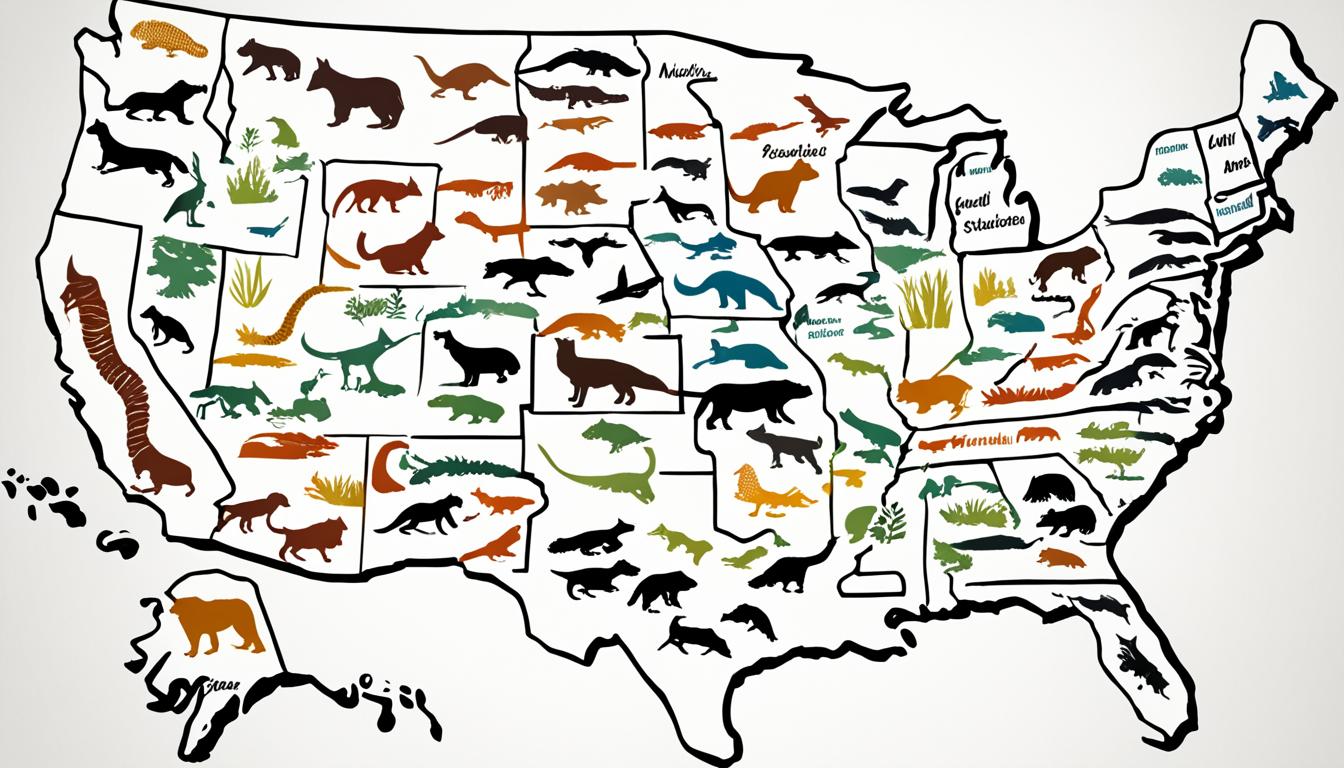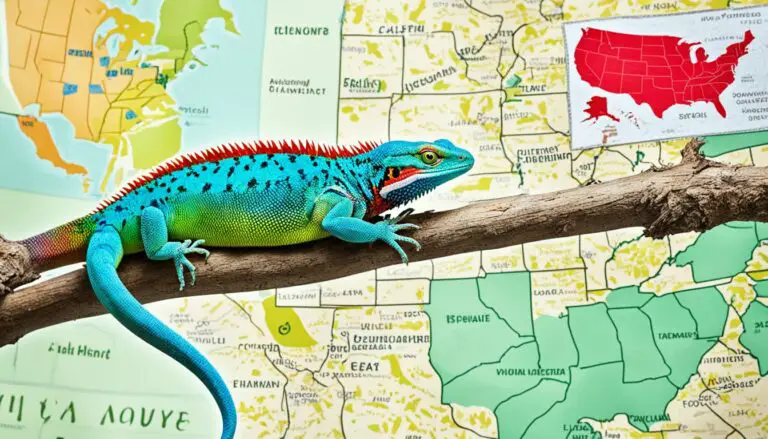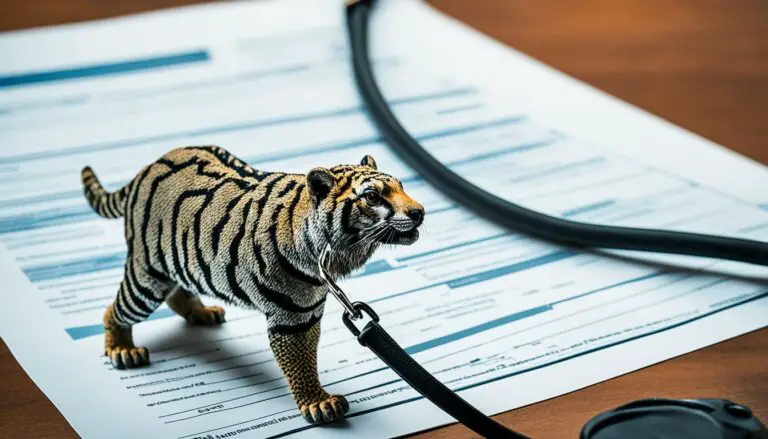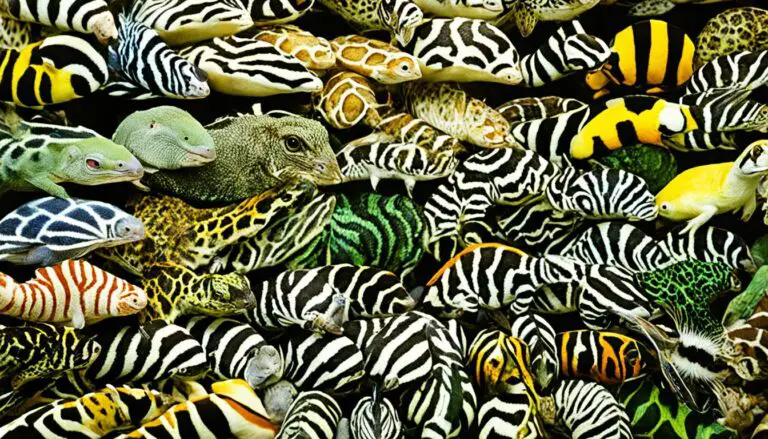Restricted Exotic Pets by State: US Regulations
Are you considering owning an exotic pet? It’s important to understand the regulations that govern the ownership of these unique animals. Every state in the United States has its own laws and restrictions regarding exotic pets. These laws are in place to protect both the animals and the public. Therefore, before bringing home that fascinating creature, it is crucial to investigate the specific regulations in your state.
Key Takeaways:
- Each state in the US has laws that regulate the ownership of exotic pets.
- These laws can change and vary from state to state, so it’s essential to stay updated.
- State regulations on exotic pets are typically enforced by game and fish commissions or wildlife-related departments.
- Some states have comprehensive bans on certain exotic animals, while others have partial bans or licensure schemes.
- Researching and understanding your state’s regulations will help ensure legal and responsible ownership of exotic pets.
How to Find State Exotic Animal Laws
To ensure legal and responsible ownership of exotic pets, it is crucial to understand the state laws on exotic pet ownership, state-specific exotic pet regulations, and state guidelines for exotic pet ownership. Finding this information may seem daunting at first, but there are several avenues you can explore to determine the specific regulations in your state.
Websites of State Departments, Divisions, and Commissions
One of the most reliable sources for state exotic animal laws is the official websites of state departments, divisions, and commissions responsible for wildlife and conservation. These official government websites often have the most up-to-date and accurate information. Look for websites that end in .gov or .state, but always verify the authenticity of the source before relying on the information provided.
Contacting Your State’s Department of Natural Resources or Similar Agency
If you’re having trouble finding the information you need on official websites, consider contacting your state’s Department of Natural Resources or a similar agency. These departments usually have experts who can provide guidance on state-specific regulations regarding exotic pet ownership. They may be able to direct you to the relevant laws and regulations or answer any questions you have.
- Check the websites of state departments, divisions, and commissions responsible for wildlife and conservation
- Contact your state’s Department of Natural Resources or similar agency
It’s important to note that while websites and government agencies can provide general information on state exotic animal laws, it is essential to consult the specific statutes and regulations for your state. These statutes and regulations will outline the specific requirements, restrictions, and guidelines for owning exotic pets in your state.
Here’s a summary of the state laws on exotic pet ownership, state-specific exotic pet regulations, and state guidelines for exotic pet ownership:
| State | Licensing or Permit Required | Restricted Species |
|---|---|---|
| Alabama | Yes | Bobcats, black bears, foxes |
| Alaska | Yes | Wolf hybrids, chimpanzees |
| Arizona | Yes | Non-human primates, certain reptiles |
Remember, each state may have its own unique regulations, so it’s vital to consult the specific laws and guidelines for your state before acquiring an exotic pet. By doing your due diligence and understanding the legal requirements, you can ensure the well-being of both yourself and your exotic pet.
Examples of State Restrictions on Exotic Pets
Each state has its own list of animals that are prohibited or restricted as pets. Let’s take a look at some examples from different states:
Alabama
In Alabama, non-native wildlife like bobcats, black bears, and foxes are not allowed to be owned without a permit. These animals are considered exotic and require special authorization for ownership.
Alaska
Alaska has strict regulations regarding exotic pets. No one can possess wolf hybrids or chimpanzees acquired after specific dates. This ensures the protection of native wildlife and promotes responsible pet ownership.
Arizona
Special permits are required in Arizona to own certain exotic pets. Non-human primates and certain reptiles fall under the restricted category, and owners must obtain the necessary permits to possess them.
These are just a few examples of the varying restrictions across states. It’s crucial for potential exotic pet owners to research and understand the specific regulations in their state to ensure legal and responsible ownership.

| State | Restricted Animals |
|---|---|
| Alabama | Bobcats, black bears, foxes |
| Alaska | Wolf hybrids, chimpanzees |
| Arizona | Non-human primates, certain reptiles |
Comprehensive Bans on Exotic Pets
When it comes to exotic pet ownership in the United States, it’s important to be aware of the state laws and regulations that govern this practice. In the case of certain exotic pets, twenty states have implemented comprehensive bans on private ownership. These bans are primarily put in place to protect public safety and the well-being of both humans and animals.
Comprehensive bans typically include a wide range of animals, such as wild cats, large non-domesticated carnivores, reptiles, and non-human primates. These animals are considered to be “dangerous animals” or are otherwise prohibited from being kept as pets due to their potential to pose a risk to humans and ecosystems.
However, it’s worth noting that some states may allow permits to be issued for specific purposes, such as education or scientific research. These permits ensure that qualified individuals or organizations can interact with and study these animals under strict guidelines and supervision.
Understanding the state laws regarding exotic pet ownership is crucial to avoid legal consequences and ensure responsible conservation of these animals. It’s always recommended to consult the specific regulations of your state and obtain proper permits or licenses if necessary.
Example of a state with a comprehensive ban: Florida
One example of a state with a comprehensive ban on certain exotic pets is Florida. The Florida Fish and Wildlife Conservation Commission (FWC) prohibits private ownership of animals such as pythons, anacondas, Burmese pythons, and many other types of large constrictor snakes. This ban was implemented to prevent the negative impact these snakes were having on Florida’s native wildlife and ecosystems.
The FWC provides resources for individuals looking to surrender or find humane facilities to relocate these banned animals. If you reside in Florida or plan to have an exotic pet in the state, it’s crucial to adhere to these regulations to protect the environment and abide by the law.
Partial Bans on Exotic Pets
Thirteen states have partial bans on exotic pets. These states may ban specific listed animals by statute but allow ownership of other non-traditional, non-domesticated animals. For example, small primates may be allowed while other wild cats or carnivores are restricted. The specific animals allowed or prohibited can vary by state, so it’s important to consult the relevant laws for each state.
| State | Restricted Animals | Allowed Animals |
|---|---|---|
| California | Tigers, bears, primates, certain reptiles | Non-venomous snakes, small mammals |
| Florida | Black bears, venomous reptiles | Small primates, non-venomous snakes |
| Texas | Lions, wolves, large non-indigenous carnivores | Small primates, non-native birds |
| Ohio | Bears, large constrictor snakes | Small primates, small mammals |

Licensure Schemes for Exotic Pet Ownership
For individuals interested in owning exotic pets, it is important to understand the licensure schemes that exist in certain states. These schemes require individuals to obtain permits or licenses from the state in order to legally own exotic animals. Let’s explore the requirements and purposes behind these licenses.
Requirements for Exotic Pet Permits
Obtaining an exotic pet permit typically involves meeting certain requirements set forth by the state. These requirements may include:
- Demonstrating appropriate conditions for animal care
- Paying the necessary fees
- Maintaining liability insurance
By fulfilling these requirements, individuals can establish their capability to provide a safe and suitable environment for exotic pets and ensure responsible ownership.
Purposes of Exotic Pet Permits
Exotic pet permits are issued by states for specific purposes, aimed at protecting public safety, native wildlife, and animal welfare. Some common purposes for issuing these permits include:
- Education: Permits may be granted to individuals or organizations involved in educational programs that showcase exotic animals to the public, such as zoos, wildlife sanctuaries, or educational institutions.
- Public Health: Certain exotic animals may pose health risks to humans due to potential diseases or aggressive behavior. Permits help ensure that owners are knowledgeable about these risks and take appropriate measures to protect public health.
- Wildlife Management: Exotic animal permits may be granted to individuals involved in wildlife management, such as those working to control non-native species or participating in conservation efforts.
It’s important to note that the specific purposes and conditions for obtaining exotic pet permits may vary from state to state. Individuals interested in owning exotic pets should thoroughly research the regulations and guidelines applicable to their state of residence.
States with Miscellaneous Regulations on Exotic Pets
In some cases, there are states that do not have specific statutory or regulatory schemes for private ownership of exotic pets. However, it’s important to note that these states may still regulate certain aspects of ownership to ensure the well-being of both the animals and the public. While there may not be comprehensive laws regarding exotic pet ownership in these states, there are still guidelines and requirements that potential owners must adhere to.
For example, some states may require health certificates for exotic pets or impose import permits to monitor the introduction of these animals into the state. These measures serve to ensure that the animals are healthy and do not pose a threat to native species or public safety.
To provide a comprehensive overview, here are the three states that have miscellaneous regulations on exotic pets:
| State | Regulations |
|---|---|
| State A | Health certificates and import permits are required for exotic pet ownership. |
| State B | Exotic pet owners must comply with specific care standards and conditions set by the state. |
| State C | Registration and identification of exotic pets are mandatory. |
While these requirements may not be as extensive as full-blown regulations in other states, they still play a vital role in maintaining the responsible ownership of exotic pets. It is important for prospective owners in these states to familiarize themselves with the specific regulations and guidelines in order to ensure legal ownership and the well-being of their animals.
It is crucial to note that even in states without comprehensive laws, exotic pet ownership should always be approached with caution and responsibility. Prospective owners should seek guidance from animal welfare organizations and consult with experts to ensure proper care and ethical ownership practices.
Conclusion
Navigating the intricate landscape of US regulations on restricted exotic pets by state requires thorough research and understanding of specific state laws. The regulations can vary greatly, with some states having comprehensive bans on certain animals, others having partial bans, and others implementing licensure schemes. It is crucial for potential exotic pet owners to consult the relevant laws and agencies in their state to ensure compliance and responsible ownership.
FAQ
What are restricted exotic pets?
Restricted exotic pets are animals that cannot be owned or kept as pets without specific permits or licenses due to state regulations.
How can I find the state exotic animal laws?
To find state exotic animal laws, you can visit the websites of state wildlife and conservation departments or contact your state’s Department of Natural Resources for information.
Can you provide examples of state restrictions on exotic pets?
Yes, for instance, in Alabama, owning non-native wildlife like bobcats, black bears, and foxes requires a permit. In Alaska, possession of wolf hybrids or chimpanzees acquired after specific dates is prohibited. Arizona requires special permits for owning non-human primates and certain reptiles.
What are comprehensive bans on exotic pets?
Comprehensive bans refer to state laws that prohibit private ownership of specific exotic animals, including wild cats, large non-domesticated carnivores, reptiles, and non-human primates.
Are there any partial bans on exotic pets?
Yes, some states have partial bans where specific animals are prohibited by statute, while ownership of other non-traditional, non-domesticated animals is allowed. The specific animals allowed or banned can vary among states.
What are licensure schemes for exotic pet ownership?
Licensure schemes require individuals to obtain permits or licenses from the state to own exotic animals. These permits may be issued for purposes such as education, public health, or wildlife management and may include requirements like demonstrating proper animal care and maintaining liability insurance.
Do all states have specific regulations on exotic pet ownership?
No, three states do not have specific statutory or regulatory schemes for private ownership of exotic pets; however, they may have regulations related to health certificates or import permits for these animals.
Source Links
- https://www.animallaw.info/content/map-private-exotic-pet-ownership-laws
- https://www.thesprucepets.com/exotic-pet-laws-1238565
- https://www.bornfreeusa.org/campaigns/animals-in-captivity/summary-state-laws-exotic-animals/
Peter Stones is the founder of Exotic Pets Place, the leading online resource for exotic pet care information.
With over 10 years of hands-on exotic pet ownership experience, he is deeply passionate about sharing his expertise to help others properly care for their unusual pets.
When he's not writing extensively researched articles or connecting with fellow exotic pet enthusiasts worldwide, you can find Peter at home tending to his own beloved menagerie of exotic animals.







